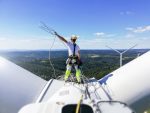
| Wind Energy Engineer Key Stats | |
|---|---|
| Education | 4+ Years |
| Job Outlook | 1.45% |
The Wind Energy industry has been booming through the last decade.
This is a result of consumer demand requesting alternative sources of energy.
This growth has contributed to the creation of several types of careers including a new engineering specialty: Wind Energy Engineer.
Because of wind energy’s complexity, several types of professional Engineers work in this industry.
Several engineering specialties lend their services to improve this type of energy source.
If you are interested in this type of career and want to become a Wind Energy Engineer , you may also be interested in the following engineering specialties that can also work in the wind energy industry:
- Civil Engineers
- Aerospace Engineers
- Electrical Engineers
- Computer Engineers
- Environmental Engineers
- Health and Safety Engineers
- Industrial Engineers
- Materials Engineers
- Mechanical Engineers
In addition, other professional careers are a part of this growing industry.
Atmospheric scientists, Wildlife Biologists and Logisticians are all a part of the Wind Energy industry.
If you are interested in mathematics, science and alternative sources of energy, consider this type of profession as a career.
To learn more information about Wind Energy Engineer, read the information below regarding the education requirements, a general job description, salary and wage information as well as the job prospects for this industry.
Table of Contents
Education Requirements to Become a Wind Energy Engineer
In order for candidates to become a Wind Energy Engineer, they need to acquire a minimum of a Bachelor’s degree.
Students should major in Energy Engineering in order to become a Wind Energy Engineer.
Students can also study a different type of engineering in order to find a job in this profession.
One alternative for a student if they want to become a Wind Energy Engineer is to study a different engineering specialty such as Civil, Aerospace or Mechanical Engineering and enter the field with these credentials.
Candidates can decide to take this route because of Wind Energy’s complex nature requiring the expertise of many specialties within engineering.
A candidate can hold one of the previously mentioned degrees and still be able to work in the wind energy field.
Candidates who look for jobs that are government positions will need to secure a special certification.
Certification is necessary for Engineers who provide their services to the public in order to ensure and promote safety standards.
Certification standards and requirements will depend on the state where you are seeking a position in.
Wind Energy Engineer Job Description
A Wind Energy Engineer is responsible for using engineering and wind power concepts in order to create electrical power.
They have the ability to create several types of equipment that will take wind energy to create electricity.
A Wind Energy Engineer will work with other professionals such as Civil, Mechanical, Industrial and Electrical Engineers to create the highest functioning wind power structures and other equipment.
A Wind Energy Engineer will design, develop, create and test equipment such as wind turbines and assure that the equipment implements the most efficient design that offers a reliable service to consumers.
Wind Energy Engineer Salary and Career Path
Engineers are some of the highest paid professionals with a Bachelor’s degree.
According to the Bureau of Labor Statistics, wages for Engineers in the Wind Energy industry will depend on several factors including the specialty a professional works in.
In 2009, Aerospace Engineers made a median wage of $94,700 per year.
Civil Engineers had a national median income of $76,500 in 2009.
Electrical Engineers made a median income of $83,000 per year.
Finally in 2009, Wind Energy Engineers have an annual median income of approximately $90,000.
The Bureau of Labor Statistics does not provide general information regarding growth for the Wind Energy industry as a whole.
However, this industry has been one of the fastest growing sectors over the past decade.
This growth should continue to look promising because of consumers’ increasing interest in seeking alternative energy sources.
Some estimates predict that Wind Energy Engineering careers will experience a growth of approximately 7 to 13 percent through the year 2018.
![]() The below information is based on the 2023 BLS national averages.
The below information is based on the 2023 BLS national averages.
National Average Salary
$117,680Average Salary by State
| State | Avg. Annual Salary |
|---|---|
| Alabama | $115,380 |
| Alaska | $108,220 |
| Arizona | $117,970 |
| Arkansas | $81,850 |
| California | $147,340 |
| Colorado | $116,810 |
| Connecticut | $118,310 |
| Delaware | $113,830 |
| District of Columbia | $127,950 |
| Florida | $105,050 |
| Georgia | $112,800 |
| Hawaii | $108,660 |
| Idaho | $119,140 |
| Illinois | $110,070 |
| Indiana | $101,030 |
| Iowa | $117,640 |
| Kansas | $98,210 |
| Kentucky | $87,810 |
| Louisiana | $112,340 |
| Maine | $111,130 |
| Maryland | $121,530 |
| Massachusetts | $127,930 |
| Michigan | $101,800 |
| Minnesota | $110,460 |
| Mississippi | $98,930 |
| Missouri | $103,690 |
| Montana | $92,890 |
| Nebraska | $102,610 |
| Nevada | $97,040 |
| New Hampshire | $132,810 |
| New Jersey | $119,140 |
| New Mexico | $135,310 |
| New York | $114,880 |
| North Carolina | $107,940 |
| North Dakota | $106,170 |
| Ohio | $102,620 |
| Oklahoma | $104,250 |
| Oregon | $115,000 |
| Pennsylvania | $121,360 |
| Rhode Island | $113,240 |
| South Carolina | $100,570 |
| South Dakota | $97,020 |
| Tennessee | $102,600 |
| Texas | $113,820 |
| Utah | $118,650 |
| Virginia | $119,140 |
| Washington | $127,440 |
| West Virginia | $102,210 |
| Wisconsin | $99,130 |
| Wyoming | $109,610 |
| Guam | $67,180 |
| Puerto Rico | $79,450 |
The top earning state in the field is California, where the average salary is $147,340.
These are the top 5 highest-paying states in the field:
* Employment conditions in your area may vary.
Frequently Asked Questions
What is a wind engergy engineer?
A wind energy engineer designs wind farms or wind farm components.
Designing a wind farm is a complex project because there are many factors that should be taken into account.
For this reason, engineers who design wind farms may have a variety of specialties.
Engineers who build wind farms are usually trained in electrical, mechanical, environmental or civil engineering.
Wind energy engineers work in the office, in laboratories or industrial plants.
Many wind energy engineers have to travel often because wind farms are located in different parts of the country.
Sometimes engineers specialized in this field may also have to travel internationally.
Among other skills, engineers need good math and analytical skills, attention to detail and leadership skills.
How much does a wind energy engineer make?
How much a wind energy engineer makes a year depends on his or her level of experience, the region where they work and the size of the company.
The Bureau of Labor Statistics doesn’t record specific data for wind energy engineers, but their earnings are comparable with salaries for engineers in general.
According to BLS.gov, the median annual wage for engineers was $96,980 in May 2018.
How much does it cost to become a wind energy engineer?
In order to become a wind energy engineer, you will need a bachelor’s degree in electrical engineering, mechanical engineering or another relevant engineering field.
Tuition costs vary depending on the program and the college you choose.
For example, the average annual out-of-state costs for mechanical engineering programs is around $42,000.
In total, a four-year bachelor’s degree program costs, on average, around $170,000.
What is the demand for wind energy engineers?
According to the American Wind Energy Association (AWEA), U.S. wind power more than tripled over the last decade with over 57,700 wind turbines operating in 41 states.
The growth of the wind power industry is expected to lead to new job opportunities in this field.
The job opportunities for wind energy engineers vary depending on the region.
According to AWEA, the Texas wind industry employs over 25,000 people, leading the nation in the number of wind industry employees.
How long does it take to become a wind energy engineer?
In order to become an engineer in the wind energy industry, you need a bachelor’s degree in a relevant engineering field.
Bachelor’s degree programs usually can be completed in four years.
Some jobs also require a master’s degree or Ph.D. in engineering.
A master’s degree can be completed in approximately two years while Ph.D. programs in engineering are typically 3 to 6 years long.
Many employers will also require certification and being licensed as a professional engineer (PE) is desirable.
Although licensing requirements vary by state, in order to become a licensed professional engineer, you will need at least four years of experience.
Experience is also very important in this field.
Participating in an internship during college can give you the experience you need to be ready for entry-level employment as an engineer after graduation.
However, you may need several years of engineering experience before being ready to work for a wind energy manufacturer.













